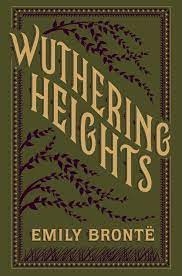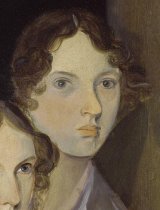Wuthering Heights Page #10
Wuthering Heights is an 1847 novel by Emily Brontë, initially published under the pseudonym Ellis Bell. It concerns two families of the landed gentry living on the West Yorkshire moors, the Earnshaws and the Lintons, and their turbulent relationships with Earnshaw's adopted son, Heathcliff.
It seemed a long while to us all—the three days of his absence—and often did little Cathy ask when he would be home. Mrs. Earnshaw expected him by supper-time on the third evening, and she put the meal off hour after hour; there were no signs of his coming, however, and at last the children got tired of running down to the gate to look. Then it grew dark; she would have had them to bed, but they begged sadly to be allowed to stay up; and, just about eleven o’clock, the door-latch was raised quietly, and in stepped the master. He threw himself into a chair, laughing and groaning, and bid them all stand off, for he was nearly killed—he would not have such another walk for the three kingdoms. “And at the end of it to be flighted to death!” he said, opening his great-coat, which he held bundled up in his arms. “See here, wife! I was never so beaten with anything in my life: but you must e’en take it as a gift of God; though it’s as dark almost as if it came from the devil.” We crowded round, and over Miss Cathy’s head I had a peep at a dirty, ragged, black-haired child; big enough both to walk and talk: indeed, its face looked older than Catherine’s; yet when it was set on its feet, it only stared round, and repeated over and over again some gibberish that nobody could understand. I was frightened, and Mrs. Earnshaw was ready to fling it out of doors: she did fly up, asking how he could fashion to bring that gipsy brat into the house, when they had their own bairns to feed and fend for? What he meant to do with it, and whether he were mad? The master tried to explain the matter; but he was really half dead with fatigue, and all that I could make out, amongst her scolding, was a tale of his seeing it starving, and houseless, and as good as dumb, in the streets of Liverpool, where he picked it up and inquired for its owner. Not a soul knew to whom it belonged, he said; and his money and time being both limited, he thought it better to take it home with him at once, than run into vain expenses there: because he was determined he would not leave it as he found it. Well, the conclusion was, that my mistress grumbled herself calm; and Mr. Earnshaw told me to wash it, and give it clean things, and let it sleep with the children. Hindley and Cathy contented themselves with looking and listening till peace was restored: then, both began searching their father’s pockets for the presents he had promised them. The former was a boy of fourteen, but when he drew out what had been a fiddle, crushed to morsels in the great-coat, he blubbered aloud; and Cathy, when she learned the master had lost her whip in attending on the stranger, showed her humour by grinning and spitting at the stupid little thing; earning for her pains a sound blow from her father, to teach her cleaner manners. They entirely refused to have it in bed with them, or even in their room; and I had no more sense, so I put it on the landing of the stairs, hoping it might be gone on the morrow. By chance, or else attracted by hearing his voice, it crept to Mr. Earnshaw’s door, and there he found it on quitting his chamber. Inquiries were made as to how it got there; I was obliged to confess, and in recompense for my cowardice and inhumanity was sent out of the house. This was Heathcliff’s first introduction to the family. On coming back a few days afterwards (for I did not consider my banishment perpetual), I found they had christened him “Heathcliff”: it was the name of a son who died in childhood, and it has served him ever since, both for Christian and surname. Miss Cathy and he were now very thick; but Hindley hated him: and to say the truth I did the same; and we plagued and went on with him shamefully: for I wasn’t reasonable enough to feel my injustice, and the mistress never put in a word on his behalf when she saw him wronged. He seemed a sullen, patient child; hardened, perhaps, to ill-treatment: he would stand Hindley’s blows without winking or shedding a tear, and my pinches moved him only to draw in a breath and open his eyes, as if he had hurt himself by accident, and nobody was to blame. This endurance made old Earnshaw furious, when he discovered his son persecuting the poor fatherless child, as he called him. He took to Heathcliff strangely, believing all he said (for that matter, he said precious little, and generally the truth), and petting him up far above Cathy, who was too mischievous and wayward for a favourite. So, from the very beginning, he bred bad feeling in the house; and at Mrs. Earnshaw’s death, which happened in less than two years after, the young master had learned to regard his father as an oppressor rather than a friend, and Heathcliff as a usurper of his parent’s affections and his privileges; and he grew bitter with brooding over these injuries. I sympathised a while; but when the children fell ill of the measles, and I had to tend them, and take on me the cares of a woman at once, I changed my idea. Heathcliff was dangerously sick; and while he lay at the worst he would have me constantly by his pillow: I suppose he felt I did a good deal for him, and he hadn’t wit to guess that I was compelled to do it. However, I will say this, he was the quietest child that ever nurse watched over. The difference between him and the others forced me to be less partial. Cathy and her brother harassed me terribly: he was as uncomplaining as a lamb; though hardness, not gentleness, made him give little trouble. He got through, and the doctor affirmed it was in a great measure owing to me, and praised me for my care. I was vain of his commendations, and softened towards the being by whose means I earned them, and thus Hindley lost his last ally: still I couldn’t dote on Heathcliff, and I wondered often what my master saw to admire so much in the sullen boy; who never, to my recollection, repaid his indulgence by any sign of gratitude. He was not insolent to his benefactor, he was simply insensible; though knowing perfectly the hold he had on his heart, and conscious he had only to speak and all the house would be obliged to bend to his wishes. As an instance, I remember Mr. Earnshaw once bought a couple of colts at the parish fair, and gave the lads each one. Heathcliff took the handsomest, but it soon fell lame, and when he discovered it, he said to Hindley—
Translation
Translate and read this book in other languages:
Select another language:
- - Select -
- 简体中文 (Chinese - Simplified)
- 繁體中文 (Chinese - Traditional)
- Español (Spanish)
- Esperanto (Esperanto)
- 日本語 (Japanese)
- Português (Portuguese)
- Deutsch (German)
- العربية (Arabic)
- Français (French)
- Русский (Russian)
- ಕನ್ನಡ (Kannada)
- 한국어 (Korean)
- עברית (Hebrew)
- Gaeilge (Irish)
- Українська (Ukrainian)
- اردو (Urdu)
- Magyar (Hungarian)
- मानक हिन्दी (Hindi)
- Indonesia (Indonesian)
- Italiano (Italian)
- தமிழ் (Tamil)
- Türkçe (Turkish)
- తెలుగు (Telugu)
- ภาษาไทย (Thai)
- Tiếng Việt (Vietnamese)
- Čeština (Czech)
- Polski (Polish)
- Bahasa Indonesia (Indonesian)
- Românește (Romanian)
- Nederlands (Dutch)
- Ελληνικά (Greek)
- Latinum (Latin)
- Svenska (Swedish)
- Dansk (Danish)
- Suomi (Finnish)
- فارسی (Persian)
- ייִדיש (Yiddish)
- հայերեն (Armenian)
- Norsk (Norwegian)
- English (English)
Citation
Use the citation below to add this book to your bibliography:
Style:MLAChicagoAPA
"Wuthering Heights Books." Literature.com. STANDS4 LLC, 2025. Web. 15 Mar. 2025. <https://www.literature.com/book/wuthering_heights_1627>.








Discuss this Wuthering Heights book with the community:
Report Comment
We're doing our best to make sure our content is useful, accurate and safe.
If by any chance you spot an inappropriate comment while navigating through our website please use this form to let us know, and we'll take care of it shortly.
Attachment
You need to be logged in to favorite.
Log In